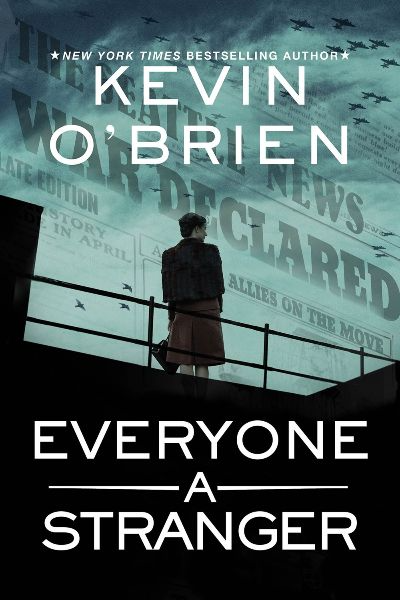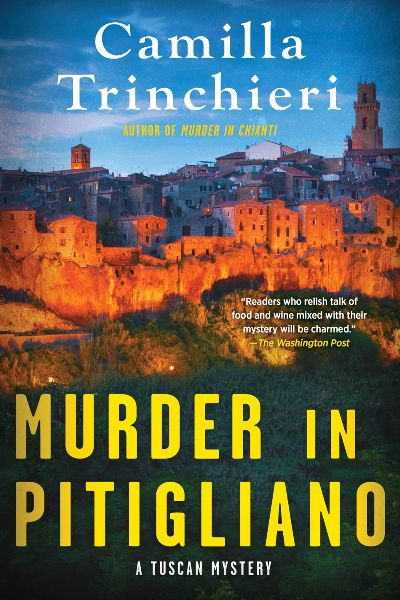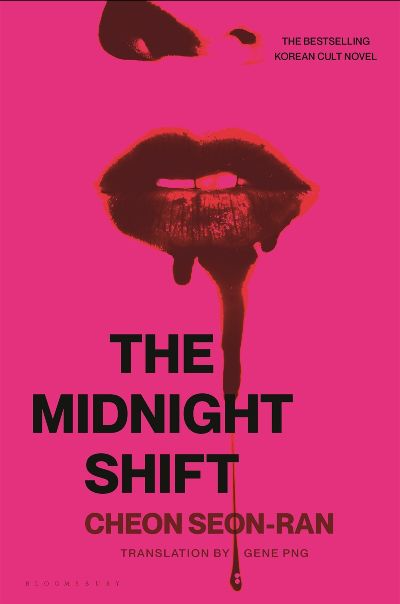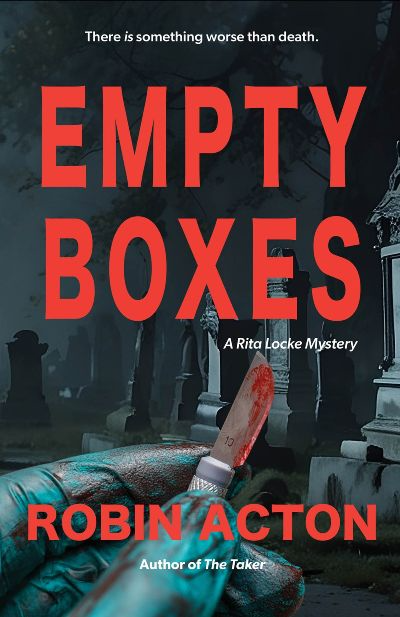Virginia Abrams lives in Washington, D.C., in 1943, and her husband has died overseas in the Pacific. The son of a prominent Senator attacks her, resulting in an unwanted pregnancy. When the son dies, his powerful parents decide to keep Virginia quiet by arranging to have her killed. Barely escaping, Virginia hops on a train and ends up on the other side of the country in Seattle. Under the identity of Ginny Moore, she rents an apartment and secures a job as a personal secretary to a well-established mystery author. But she can’t escape the feeling that the senator’s henchman will find her. When a young mom who looks almost identical to Ginny dies in what seems like an accidental fall, she starts to question everyone around her. Can anyone be trusted? At the height of WWII, when spies and traitors lurk around every corner, the paranoia escalates above a 10 in O’Brien’s latest thriller. In a story that feels like O’Brien traveled back in time and stole the manuscript straight from Alfred Hitchcock’s desk, Ginny’s struggle to find solace will have readers keeping their lights on while reaching for tissues. Everyone a Stranger is arguably the author’s best novel to date.
Review
Margaret, large, 50ish, probably neurodivergent, is a remarkably good assistant in a university lab doing botanical research into possible cancer cures. The bottom drops out of her world when she discovers the body of her beloved boss, Dr. Deaver, in his office, quite dead. In true scientific fashion, she notices the small details that no one else, especially the bumbling campus police, takes account of. Her comments are quickly dismissed and she is pressed into rewriting an important grant application to credit someone who deserves no credit at all. There are deans grasping for academic glory, scientists looking to make big bucks, and only Margaret who wants to know the truth. She finds a friend in Joe, a new custodian whose personality seems out of keeping with his job. Together they work to discover what is truly going on, and not only find a murderer, but also save the cutting-edge research study. Margaret is a delight, and the situation requires her to open herself to friends and new possibilities. The ending leaves the possibility for more from Margaret and Joe, which would be a fine addition to the genre.
There’s no horror here but plenty of scares as nine-year-old Effie must parent her siblings in her family’s freezing shack in the western New Zealand bush. With the nearest town, Koraha, six hours walk through dense forest, Mum with a new baby and Dad mostly off hunting and fishing, it’s all Effie can do to keep the little ones fed and warm. The new baby, the fourth child and named four, heralds a much harder chapter for the family, one that ultimately sees Effie living as an adult in Scotland. She’s compelled to return to New Zealand when reports reach her that a little girl—unknown to Effie but looking exactly like her—has shown up in the town, injured and starving. Who she is and what happened in the past is a twist-filled saga that drops readers right into the dangerous landscapes that are both the New Zealand wilderness (“an unforgiving thing that would eat them up”) and the off-off grid family. One to remember, and a must for fans of Barbara Kingsolver’s Poisonwood Bible and Alisa Alering’s Smothermoss.
Tiny Dickens Island, located in the sound between Connecticut and Long Island, has a small permanent population composed of families in the midst of some sort of feud or another. Delia has come back after years of living in Manhattan to take up her role as mother to teenage Connor and part manager of the family’s general store. She’s inherited her grandmother’s house and for now is loving being back, though is unsure of her maternal success. Connor finds a secret room in grandma’s house with old books and what may be a pirate map. Delia encounters grandma’s ghost, who visits the room occasionally and offers a unique perspective on island history. The map is stolen by local miscreants and doesn’t lead to treasure but rather to a long-buried body that brings old scandals to the present. With logic, the help of an old love, and grandma’s ghost, Delia puts much of the puzzle together, leading to a solution to the murders and to some of the family feuds. An enjoyable, sandy cozy with the author’s promise of more to come from Dickens Island.
Brace yourself: this tale of obsession is WILD. Our DC public relations protagonist, Margo, is worried her life isn’t going as planned, with the central problem being her lack of an acceptable (read: fancy) home. Once she and her increasingly worried husband, Ian, have that, she will allow herself to get on with the rest of the plan. But as it stands, she has “No house, no baby. No house, no family. No house, no life.” She finds the perfect place but knows they will probably be outbid for it, like always. The DC property market is no joke, but neither is Margo’s determination to have that home no matter what, and her increasingly unhinged measures to be the winning bidder will keep readers gripped. If you like a main character who takes up all the space, this one’s for you, and it’s a must for book clubs as well, as Margo’s antics beg to be dissected over wine.
Kipness compellingly combines her background as a sports reporter with her love of crime fiction, and her latest Kate Green thriller is her best yet. Kate is a sports reporter with a recent Emmy win, and she’s asked to cover the U.S. Open and specifically to interview two tennis stars: Brynn, an arrogant but talented up-and-comer, and Lucy, a veteran facing her last event. Brynn does not trust Kate at all, while Lucy is nicer but also hesitant. As Kate continues her coverage, she begins to uncover details that seem straight out of a soap opera rather than the tennis circuit. When Lucy forfeits a match the day after Kate interviews her, the reporter knows that something happened to Lucy and then receives a photo of the bound and gagged player. Kate can’t help but investigate, an effort that will uncover secrets about Lucy and Brynn and reveal personal elements of Kate’s life. There are many suspects here and it is so much fun from the first page to the last. Kipness’s engaging novel is perfect for newcomers to and fans of the series and is a blend of Hank Phillippi Ryan’s work and the Myron Bolitar novels by Harlan Coben. With a recently announced TV deal with Universal Television, picking this up should not be a close call.
A homeless man is discovered dead in Bristol’s park-like Clifton Downs. End of the story, right? Not if you are DS Cross, who “was always drawn to cases like this. Cases of the dispossessed. The outsider. He related to them because in many ways he was one himself.” Cross has Asperger’s syndrome, and unlike his peers, he is slow to write off the victim. Indeed, his persistence, his dogged examination of all the details, and his reexamination of the evidence manage to keep the case alive—traits that serve the victim but set his fellow officers on edge, ready to wrap up the case. Say what they want, Cross has the best conviction rate of his precinct by a long shot. In seeking to resolve the murder of the homeless man, Cross realizes he needs to go back to a cold case from 15 years ago, despite the scorn he receives from his boss and peers. Socially awkward detectives are nothing new, but Sullivan goes deep into Cross’s self and his struggle to identify the personalities of others: he combines physical expressions with tone to make inferences. The publishing history of this series is extraordinarily confusing, but we know for certain that Grove is publishing the first three books in the series, as well as The Tailor, the eighth, in October. Order multiple copies, there should be a big audience for Cross, both those with Aspergers who rarely see themselves depicted with any accuracy and fans of police dramas like Tana French, Donna Leon, and Louise Penny.
A new installment in Trincheri’s mystery series is a call for nothing less than celebration. Retired NYPD detective Nico Doyle, now living in Tuscany, takes it upon himself to investigate a murder that has torn a family apart. A message discreetly deposited in the collar of Nico’s dog (“Please help my babbo”) by Cilia, a seven-year-old girl, piques Nico’s interest. Enough that he decides to take up the investigation and locate Saverio, Cilia’s father, who disappeared after his partner in an electronics store was killed, with Saverio the carabinieri’s number one suspect. Nico starts by questioning some of the local folk and friends in Gravigna, his hometown, but eventually he heads off to the larger, beautiful town of Pitigliano, where the murder took place. Rich in culture, food, wine and—above all else—friendship, this is sure to be loved by fans of cozyish series, gentle police procedurals, and Italia!
In this Korean bestseller, police detective Suyeon is called to the scene of the fourth suicide of an elderly patient at a crumbling hospital in a deserted part of Incheon. Her boss believes the deaths, spurred perhaps by pervasive depression and loneliness, are coincidental and sees no point in investigating further, especially since their families had abandoned the dead. But Suyeon thinks something is off. All four victims, who suffered from dementia, jumped from the hospital’s sixth floor, but very little blood was found at the spots where they landed. Returning to the hospital later that evening, Suyeon encounters a mysterious Korean-French woman named Violette, who tells her, “A vampire did it.” A skeptical Suyeon angrily dismisses Violette until the autopsy of a fifth suicide reveals two puncture holes in the victim’s neck and the body drained of blood. Claiming to be a vampire hunter, Violette explains to Suyeon that someone at the hospital is helping a vampire target his next victims. As Suyeon seeks to identify that particular nurse, the narrative shifts back to 1983 France, when a teenage Violette, adopted by loving French parents but feeling isolated and lonely because of her Koreanness, begins a strange, intense, almost Sapphic friendship with the enigmatic, barefooted Lily. Skillfully translated (but a glossary of Korean terms would have been helpful), Cheon’s novel is more than a queer paranormal mystery (the inconsistent vampire elements are its weakest parts); instead, it’s an eerie and bleak portrait of societal loneliness, isolation, and marginalization.
The title is a hint to a major plot element in this somewhat tangled, dangerous, multi-crime story with an intrepid reporter at the center. Rita Locke, crime reporter for a major Pittsburgh paper, is awakened early on a Sunday, her day off, by one of her police sources alerting her to a grisly murder in a funeral home. It’s the last straw for her boyfriend, and as she leaves for the crime scene, he ends their relationship. The body was found by a local beautician, and she is mighty nervous when interviewed by Rita. There are dead witnesses, anonymous clues, stolen jewelry, fake medical practitioners, and medical schools, nearly deadly foreign travel, returning boyfriends, and of course, the empty coffins referred to in the title. Yes, the story is crowded, but it is refreshing to have a reporter at the head rather than a cop or a PI, and readers will not be able to put this down towards the end. Here’s hoping for more about Rita Locke.










